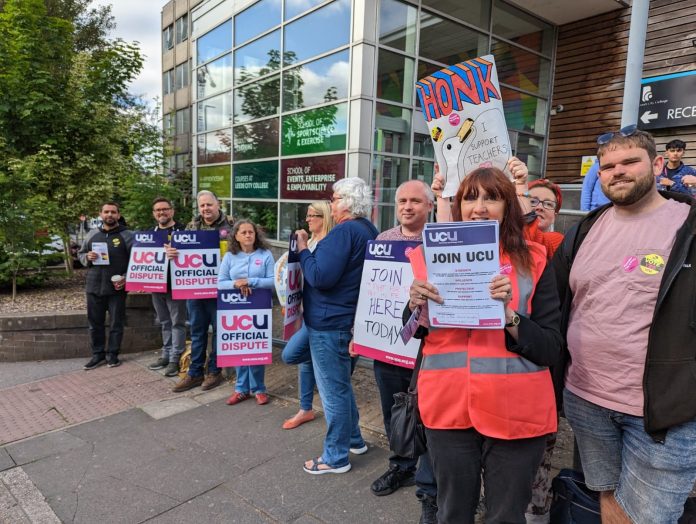Delegates from UCU Further Education branches will meet on Saturday 13 April at a special conference to determine whether to endorse the left-leaning Further Education Committee’s (FEC) ‘Levelling up the sector – no one left behind’ strategy. The levelling-up strategy was passed by the FEC in February and resolved to prepare for an aggregated ballot at the end of the summer term for binding national pay bargaining and a 10% pay rise. The right wing of the FEC proposes overturning and replacing the strategy with an opposing ‘New deal for FE’ strategy developed by union officials. Socialist Party members support a national campaign for pay bargaining and have confidence that members can win the ballot, and the dispute, if given a serious, fighting lead.
Duncan Moore, Socialist Party, UCU NEC (personal capacity)
Unlike in schools, where the teacher’s unions negotiate with the government for collective pay rises across the country, in colleges pay deals are struck between local union branches and the individual college employers. The Association of Colleges (AoC) makes recommendations on pay to college employers each year; but these are only recommendations. College bosses can and often do ignore these, and offer their staff significantly less.
This has been the case since 1993 when FE colleges were removed from local authority control and turned into private businesses. Privatisation was a disaster. FE lecturers are now paid £9000 a year less than school teachers on average, whereas prior to incorporation, they typically earned more. In the last decade, staff have lost 40% of their income in real terms. Half of FE staff quit the profession within three years of starting teaching, and the remaining staff come under intense workload pressure, on average spending up to twelve hours a week working for free during evenings and weekends to complete admin.
The failure of privatisation was tacitly acknowledged by the government, who returned colleges to the public sector in 2022, with finances coming under the remit of the Department for Education.
The next step for members is to win back binding national pay agreements. The union now needs to agree a strategy to achieve this.
Previous ballots for action on binding agreements have taken place on a disaggregated (college by college) basis, and have been rolled together with branch campaigns for better pay and conditions for their own members. The result has been that where branches have managed to secure improvements on pay and conditions, they have settled with their own college bosses and withdrawn from the national dispute, leaving other branches to carry on fighting alone and leading to a collapse of the campaign for national pay bargaining.
The FEC agreed in February to move to a national aggregated ballot in England before the summer break and to commence strike action in September over the three core demands in the 2024-25 pay claim: pay, workload and national pay bargaining. This followed an indicative ballot of members last year showing 87% support for a national strike, on a turnout of 51%.
The same FEC meeting rejected recommendations from the union official responsible for FE, which included a strategy titled “a new deal for FE”, that excludes a national aggregated ballot in the next two years while lobbying labour to implement the union’s campaign pledges.
According to the union’s constitution, General Secretary Jo Grady acts under instruction from the FEC. In words, she supports the move to a national ballot. However, there is clearly strong opposition from some of the union officialdom to moving to an aggregated ballot this year.
FEC members opposed to a national strike in September have sent out emails to branches warning members against action, citing advice from the union’s lawyers, expressing doubts about members’ readiness to fight, and arguing instead that the union can secure national agreements from an incoming Labour government through lobbying and influencing their manifesto.
Members have been mobilised by the right wing to requisition a special sector conference this weekend to decide whether to go with the FEC’s proposal for a national ballot in the summer or overturn it and replace it with a variation of the “new deal” strategy preferred by the union’s right-wing and union officials.
In any industrial dispute, the key questions in workers’ minds are: What can we win, and is there a pathway to victory?
Socialist Party members in the UCU are clear. Given Starmer’s commitment to Tory spending plans and “tough choices”, going to Labour with the begging bowl will achieve nothing for FE staff. We can put maximum pressure on Starmer by showing readiness to fight industrially and by backing political candidates who support our members, whether they are Labour candidates or otherwise.
The Socialist Party’s position is to support a national ballot. We have confidence that our members can win when given a serious, fighting lead. However, this needs to be properly prepared for and built. The FEC motion developed a detailed plan for briefing branches and members about the issues at stake as part of a ‘Get the vote out’ campaign. These preparations have been delayed because of the special conference and it is vital that if the conference endorses the strategy, HQ must immediately launch these initiatives.
Only unified action across the whole union can succeed in putting pressure on the employers and the government to submit to our demand for binding national pay agreements. Delegates should endorse the ‘levelling-up’ strategy and build the campaign in their branch. We can win this ballot and the fight!







